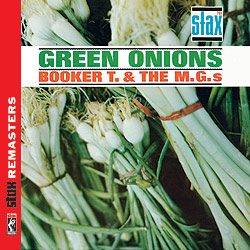Booker T. & The M.G.s: A Sweet, Sweet Serving of Green Onions
Published on August 28th, 2012 in: Current Faves, Music, Music Reviews, New Music Tuesday, Retrovirus, Reviews |By John Lane

Yes, Virginia, back in the ancient times of the mystical 1960s, there was a universe that expanded far beyond The Beatles, even though they were heaven-sent. While The Beatles were decompressing after playing to a kajillion people at Shea Stadium or elsewhere, I guarantee you that somewhere in their collective mind were the righteous sounds of Booker T. & The M.G.s taking them to a soulful place.
My affinity for the reissue of this classic instrumental album dates back almost 30 years ago, when I was working a lousy “first job” at a dry cleaner’s. While there I befriended a guy a few years older than me who seemed incredibly grown-up, at least to this kid who couldn’t drive and hadn’t yet had a truly serious relationship with a woman. When you’re a young teen subconsciously seeking a big brother, you can do no worse than having that ersatz mentor put two tapes in your hands: one, a Ventures tape (“Walk Don’t Run” became my imagined theme song for a good year) and the second being Booker T. & The M.G.s album Green Onions. If my limited experience of The Beatles and The Who made me think I’d been granted the keys to Heaven, well, access to these two albums made me feel like I’d been given a secret pass to Heaven’s cooler, hipper nightclub that few are allowed to frequent.
Now, a little historical perspective: In 1962, “Green Onions” was a smash single. It’s a classic instrumental blues riff delivered along that edge of urgency and not-giving-a-damn coolness. The organ (Booker T.) is the star, always the star—with the added delicious irony that this seemingly white-boy instrument (I mean, the organ? Square!) is given a singular, beatific drive by an outrageously talented black fellow. To any racists or segregationists back in ’62 tipping their ear to the radio, waiting for the dreaded moanings of “Negro” singers poisoning God-fearing, white youths, well, this song skated on past the ugly radar. The implicit sexuality and maybe benign dalliance with pot-smoking is all tied up in the smooth glide of this song. Oh, it’s there if you look for it, sure; but if you call it out, at the top of your lungs, then that’s not cool.
“Green Onions” is/was a secret handshake, and it’s an all-encompassing one at that. Being wise to “Green Onions” was akin to knowing the secret password at the Speak Easy back in the ‘20s; you’re let in with a wink and a nod, nothing more. Booker T. understood that coolness, at its core, is colorblind, which is why his band was a healthy mix.
And there’s a reason why this song was still being played, being loved, about four years later (as the above clip shows). It’s because instrumentally, Booker T. & The MGs had thrown down a simple gauntlet that they knew nobody would pick up. British Invasion bands would go from cute n’ cuddly to introspective to psychedelic to roots-y, while Booker T. knew that reinvention was best left to those who had to think of new ways of being clever. With each passing year, “Green Onions” is rooted in a timeless coolness. When a band plays “Johnny B. Goode,” they’re revisiting a quaint time, but if that band covers “Green Onions,” we’re all brought right up to speed. Happiness is here, not something that feels ancient or oddly referential. Play the song for anybody now, no matter how young or old, and they know it; it’s in their bones. They don’t know it by name, or the band’s name necessarily, but it’s something understood. Empires crumble, presidencies flitter past like pages in a book, but “Green Onions” stands resolute among all that change. Have we put a man on the moon yet? No? Yes? Whatever, groovy, let’s roll.
Capitalizing on the hit single, Stax Records released this all-instrumental album in October 1962, and the album went no higher than #33 on the record charts; not a bad showing, but perhaps because the single had already been snarfed up by half the planet, and teens were a more singles-obsessed culture then (as opposed to album-obsessed). Besides the signature tune, the other jewels on the album are “Mo’ Onions” (a cash-in on the previous success) and “Can’t Sit Down” (a dance song that probably had parochial school nuns tearing out their hair at high school mixers). That said, the beauty of this record is in its unassuming fidelity; the recording technology was primitive then, and the band wasn’t exactly the Philharmonic, but good Lord, who cares? When you hear Green Onions, it’s impossible to not feel a part of something happening, no matter what your age. And a great footnote here: The band does a cover of “Twist and Shout,” which pre-dates The Beatles’ cover of the classic Isley Brothers tune.
The snap of the snare, the swoosh of Booker T.’s organ, and the outrageous interplay between guitar and bass is intoxicating. By re-releasing this remastered version, Stax Records initiates a whole new generation to the secret handshake.
The Stax Remaster of Green Onions was released through Concord Music Group on July 24 and can be purchased directly from their website.
Time limit is exhausted. Please reload the CAPTCHA.